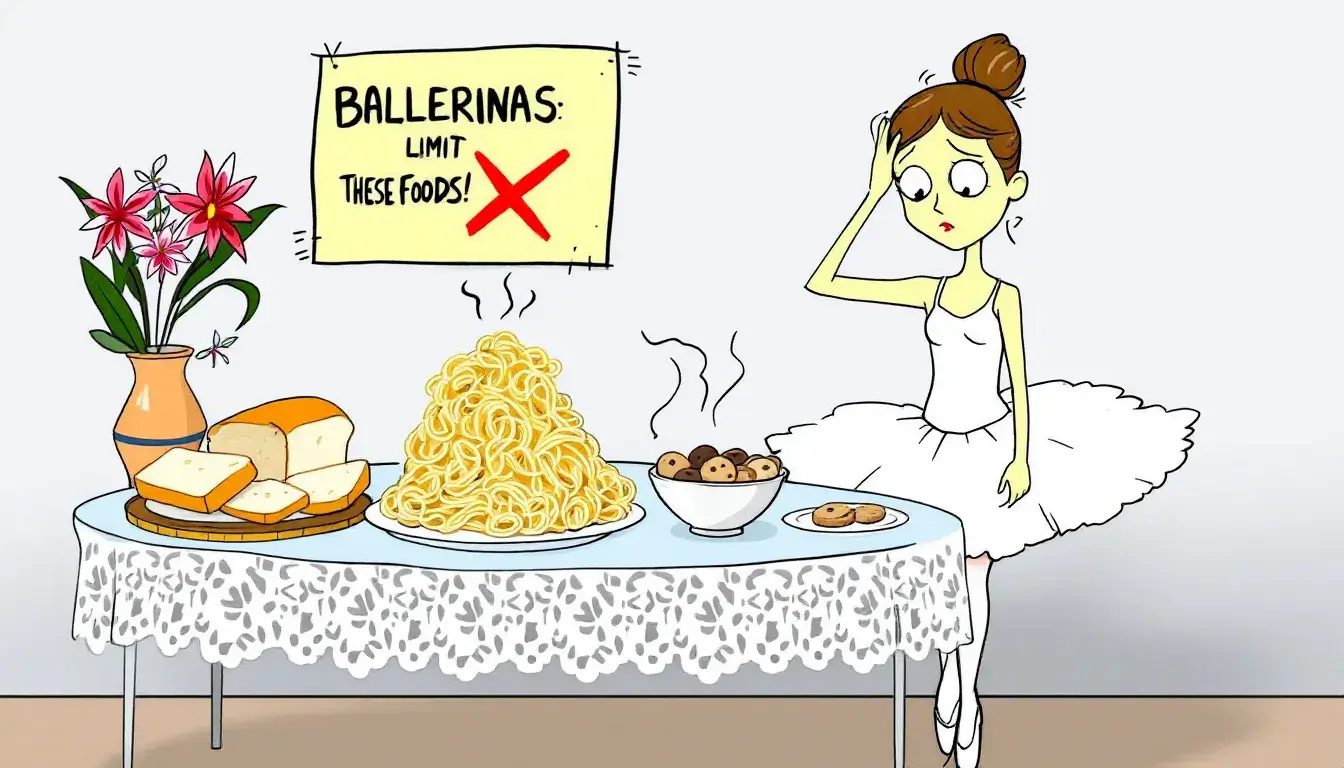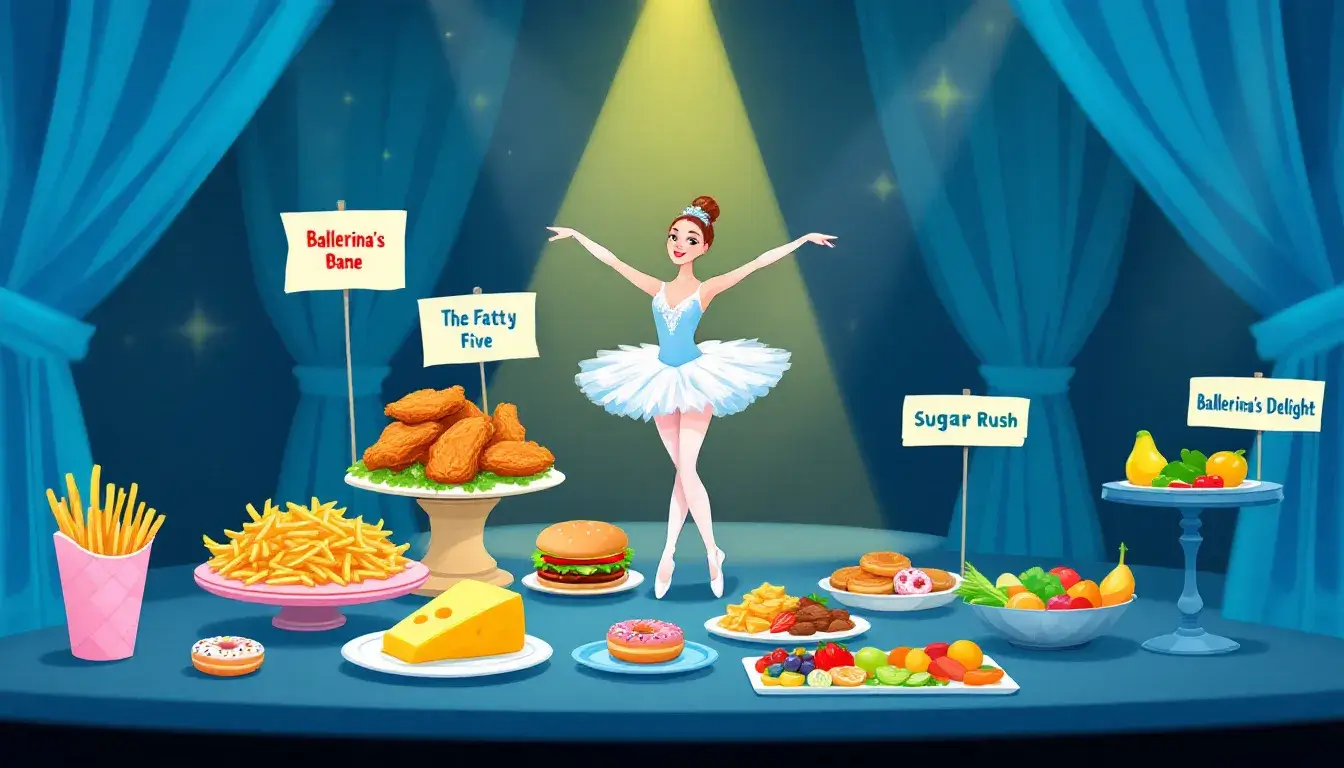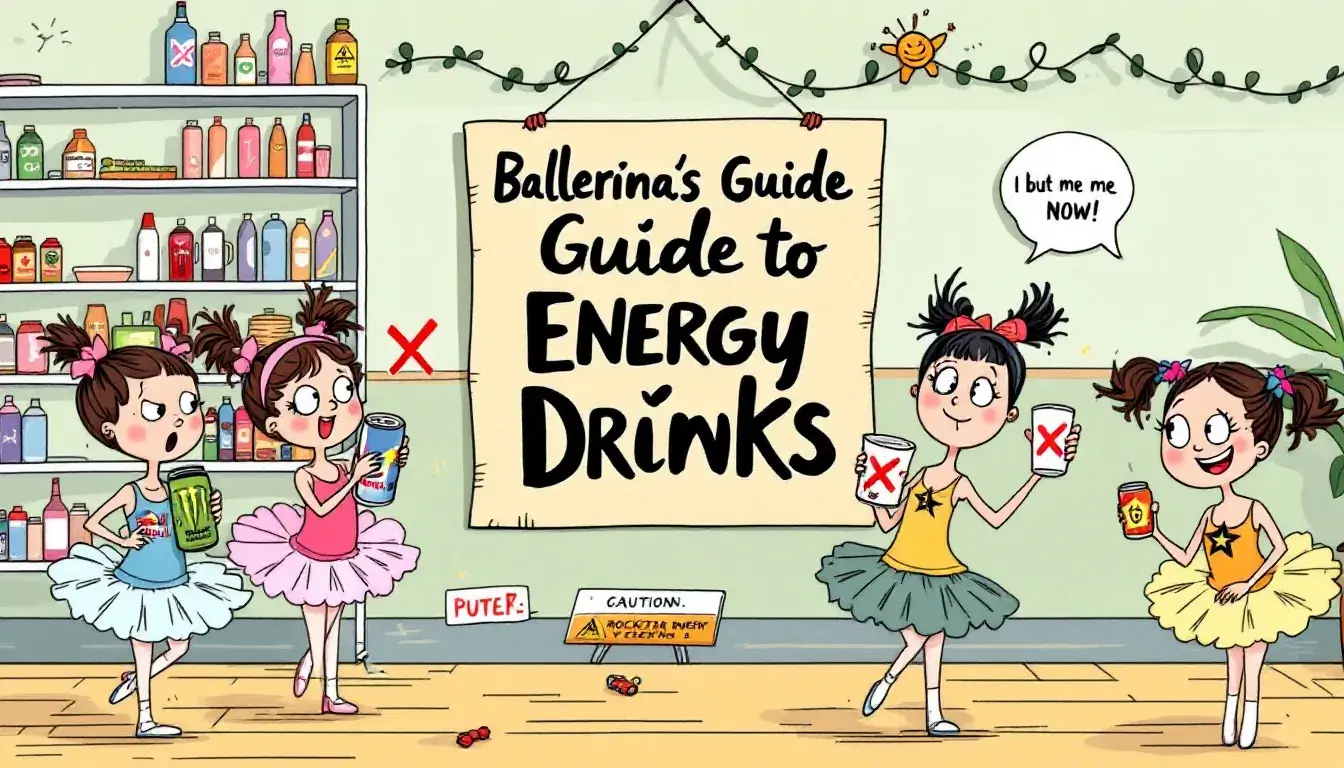What should a ballerina not eat to ensure top performance? This article outlines key foods that dancers should avoid to maintain optimal health, energy, and focus. Discover essential tips to stay at your peak in practice and on stage.
Graceful Insights
- Ballerinas should avoid processed foods, refined sugars, and simple carbohydrates, as these can cause energy fluctuations and hinder their performance.
- High-fat foods, excessive caffeine, and inflammatory foods can negatively impact health and recovery and thus should be limited in a ballerina’s diet.
- Consuming natural, whole foods and lean proteins enhances performance, promotes better hydration, and supports energy stability and overall well-being.
Art de Podcast
| Food Category | Examples | Reasons to Limit/Avoid |
|---|---|---|
| Sugary Foods and Drinks | Candies, pastries, sodas, energy drinks | High sugar content can lead to rapid spikes and subsequent crashes in blood sugar levels, resulting in fluctuating energy and reduced stamina during training and performances. |
| Refined Carbohydrates | White bread, white rice, regular pasta | Lack of fiber causes quick digestion, leading to energy spikes and crashes. Opting for whole-grain alternatives provides sustained energy release. |
| Fried and Greasy Foods | French fries, fried chicken, chips | High fat content can slow digestion, causing feelings of sluggishness and discomfort, which may impede performance. |
| High-Fat Dairy Products | Full-fat cheese, cream-based sauces | It may cause bloating and digestive discomfort in some individuals, potentially affecting comfort and performance. |
| Processed Snacks | Packaged cookies, crackers, and instant noodles | Often high in unhealthy fats, sugars, and sodium, leading to inflammation and decreased energy levels. |
| Caffeinated Beverages | Excessive coffee, certain energy drinks | Overconsumption can lead to dehydration and increased heart rate, negatively impacting performance and recovery. |
| Carbonated Drinks | Soda, sparkling water | It can cause bloating and discomfort, which may interfere with physical activity. |
| Artificial Sweeteners | Diet sodas, sugar-free candies | It may cause digestive issues, such as bloating and gas, in some individuals, potentially affecting their performance. |
Avoid Processed Foods

Processed foods can hinder a ballerina’s performance due to their unhealthy fats, excessive sugar, and additives that harm ballet dancers’ physical abilities and overall health. What ballerinas eat can significantly impact their training and performance.
Eating more whole foods helps maintain steady energy levels and improves healthy eating habits. Whole grain crackers are a great snack and lunch option for sustaining energy levels and enhancing performance.
Processed Meats
Processed meats, such as sausages and deli meats, contain high sodium levels, which can lead to dehydration and negatively impact performance. The preservatives in these meats can also cause inflammation, which can affect recovery and overall well-being.
“Lean protein” in food like grilled chicken or fish can help stay hydrated and reduce inflammation.
Refined Sugars
A high intake of refined sugars can cause energy fluctuations and challenges in maintaining focus, energy, and overall performance. These sugars lead to quick bursts of energy followed by crashes, which are unsuitable for sustained physical activity.
Complex carbohydrates, such as whole grains, help the body maintain more stable energy levels.
Artificial Sweeteners
Artificial sweeteners in diet foods and beverages can disrupt metabolism and gut health, leading to digestive issues. They can also increase appetite and cravings, making it harder to control diet and maintain performance.
Natural sweeteners, such as honey or maple syrup, can help improve dietary control.
Limit Simple Carbohydrates

Simple carbohydrates can cause sharp fluctuations in blood sugar levels, negatively impacting endurance and performance. While they provide an instant energy boost, their short-lived effects are often followed by crashes.
Favoring complex carbohydrates over simple ones helps maintain stable energy levels.
White Bread and Pasta
White bread, rice, and pasta lack essential fiber, leading to energy dips and digestive issues that hinder stamina and performance.
Whole-grain meal alternatives offer better nutritional benefits and help maintain a balanced energy level. Consider eating whole wheat bread as a nutritious breakfast alternative to white bread.
Sugary Snacks
Sugary snacks are high in carbohydrates and calories but low in nutritional value, which can lead to weight gain. They cause rapid blood sugar spikes, followed by crashes that leave you feeling tired and unfocused.
Snacks and foods with more nutritional benefits, such as fruits, vegetables, or nuts, help maintain steady energy levels.
Soft Drinks
Soft drinks contain high levels of sugar and caffeine, which can lead to dehydration and hinder muscle performance. Excessive sugar consumption can also lead to energy crashes, making consistent performance difficult.
Water or natural fruit juices are healthier alternatives for hydration.
High-Fat Foods to Avoid

Healthy fats are essential for a balanced diet, but high-fat foods, such as bacon and processed meats, can be detrimental. Saturated fats can increase inflammation and pose various health risks.
Healthier fat sources promote better performance and aid recovery.
Fried Foods
Fried foods are rich in unhealthy fats and high in calories, leading to weight gain and lethargy, which makes it challenging for ballet dancers to lose weight and maintain the energy levels required for dancing.
Foods and vegetables prepared with healthier cooking methods, such as grilling or baking, help maintain better energy and overall performance. Incorporating whole wheat bread into meals can also be a nutritious option to sustain energy and enhance performance.
Fast Food
Fast food is notorious for its high levels of trans fats and sodium, which negatively impact the health and performance of non-dancers. These foods typically lack essential nutrients, making them unsuitable for a professional dancer’s diet.
Home-cooked meals with fresh ingredients provide better nutritional value and support performance.
Full-Fat Dairy
Full-fat dairy products can be difficult to digest, causing discomfort and bloating during physical activity. These issues hinder comfort and performance, so choosing lower-fat dairy options or dairy alternatives, such as almond milk, is beneficial.
Beware of Certain Proteins
Not all protein sources are beneficial for ballerinas. Some can hurt health and performance. Selecting proteins that meet dietary needs and promote overall health is essential.
Red Meat
A high intake of red meat can lead to digestive difficulties and increased body inflammation, which can hinder performance. Lean proteins, such as chicken or fish, provide essential nutrients without negative side effects.
Protein Shakes with Additives
Many protein shakes contain untested additives and artificial ingredients that pose health risks, including unwanted weight gain. Reading labels carefully and choosing shakes with natural ingredients, such as whey protein powder, helps maintain a healthy diet.
Other Processed Meats
Due to their high sodium and preservative content, processed meats pose significant health risks. They can lead to dehydration and inflammation, negatively affecting performance, sports nutrition, and recovery.
Avoid Excessive Caffeine

Caffeine enhances energy and alertness, but excessive intake can lead to jitteriness, anxiety, and disrupted sleep.
Moderating caffeine consumption helps maintain optimal performance.
Energy Drinks
Energy drinks contain high levels of sugar and caffeine, which can lead to dehydration and an increased heart rate. These effects can overshadow a well-balanced diet and overall health.
Super Caffeinated Beverages
Highly caffeinated beverages disrupt sleep patterns and increase anxiety, affecting performance. Moderating caffeine intake and choosing beverages with lower caffeine content helps maintain better health and performance.
Coffee Alternatives
Many coffee alternatives contain hidden sugars and artificial ingredients that undermine nutritional goals. Choosing natural options without added sugars contributes positively to the diet.
Foods That Cause Inflammation

Certain foods can trigger inflammation, which affects recovery times and overall health. Avoiding these foods helps maintain optimal performance and well-being.
Refined Grains
Refined grains, such as white rice and bread, lack essential nutrients and fiber, leading to rapid fluctuations in blood sugar levels. Replacing refined grains with whole grains, such as brown rice, provides better nutrition and stable energy levels throughout the day.
Certain Oils
Oils high in omega-6 fatty acids, like corn and soybean oil, contribute significantly to inflammation. Choosing oils with healthier fat profiles, like olive oil, helps the diet and body reduce inflammation and support overall health.
Sugary Desserts
High-sugar desserts can exacerbate inflammation and hurt overall health. Consuming these desserts after meals sparingly and choosing healthier alternatives helps maintain better health and performance.
Alcohol and Its Effects
Alcohol is a diuretic, leading to increased fluid loss and negatively impacting hydration and focus. Avoiding excessive alcohol helps maintain better hydration and performance.
Wine and Spirits
Moderate drinking of wine and spirits during dance can hinder dancer recovery from physical exertion and impair judgment, increasing the risk of accidents during dance practice.
Beer
Beer can cause digestive discomfort and bloating, which is detrimental to ballet dancers. Non-alcoholic beverages help ballet dancers avoid these issues and improve their performance.
Cocktails
Cocktails can negatively affect hydration, liver function, and overall performance. Mindful alcohol intake and healthier choices help maintain optimal health and performance.
Resume
Summarize the key points discussed in the blog post, emphasizing the importance of eating or avoiding certain foods to maintain optimal ballet performance. Conclude with an inspiring message encouraging readers to make healthier dietary choices to support their demanding lifestyle as ballerinas and ballet dancers.







